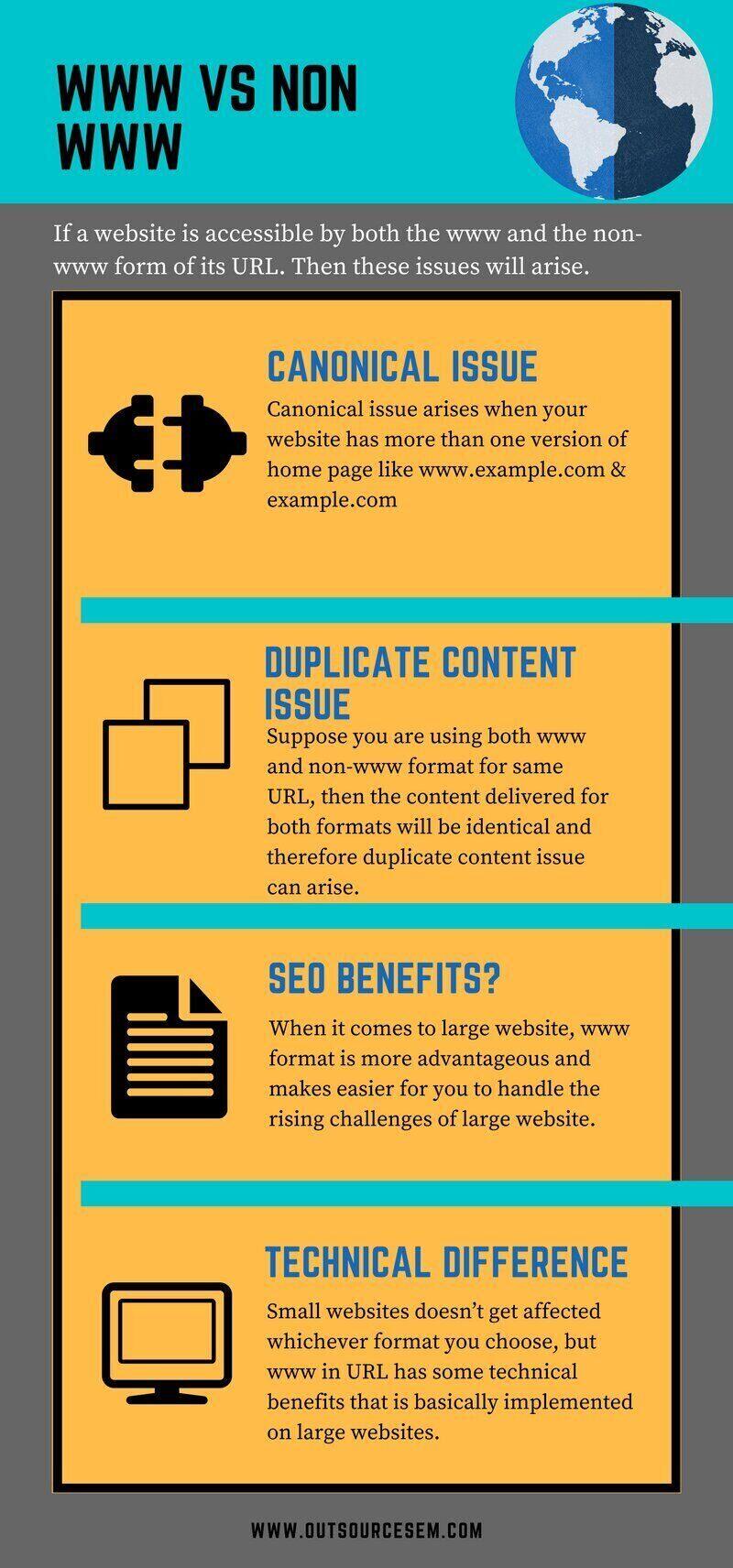Should you have the domain name with or without www for your website? Which is better from SEO perspective? What are the benefits of using www or non-www for website URL? What is the difference between them? Generally these questions strikes in everyone’s mind while developing their website. And therefore, I would like to discuss this topic in my article.
Let’s begin with, which one is better, being to the point I would like to tell you that both www and non-www format are similar for any ordinary user or small websites. There is no difference between them and actually it all depends on your personal choice and desire. You can choose either of them, but the only thing you must remember is choose only one format and try to be consistent with what you choose. It will make your website appear more consistent to your users as well as to search engines. You can set your preferred domain with Google Webmaster tools. But then there are some technical advantages of www over non-www format which you must understand before Outsourcing SEO services, these advantages will be discussed later in this article.
I would say there is no need to modify website’s URL just for including or excluding www. Just go for one format either it be www or non-www else it can harm your SEO efforts. Let me explain how, if a website is accessible by both the www and the non-www form of its URL. Then there will be canonical issue.

Canonical issue – According to Matt Cutts, “Canonicalization is the process of picking the best URL when there are several choices, and it usually refers to home pages.”
Furthermore, Matt Cutts have explained with an example –
• www.example.com
• example.com
• www.example.com/index.html
• example.com/home.asp
All of these seems to be same URL for general people but the search engines treat them completely distinct from one another. Also technically all of these URLs are different. A web server could return completely different content for all the URLs above. When Google “canonicalizes” a URL, it tries to pick the URL that seems like the best representative from that set.
Duplicate content issue – Suppose you are using both www and non-www format for same URL, then the content delivered for both formats will be identical and therefore duplicate content issue can arise. Apart from that, it negatively affects your page rank and splits the link juice between two URLs.
Now, you must be wondering what to do if the links are pointing to both formats of URL? Or How to change from non-www to www format?
Then I would say it is very simple and easy, you just need to setup 301 redirect. This will pass your link juice to the redirected page and you’ll not lose your websites ranking on SERP. From this, I’m sure you have understood how 301 redirects helps in preserving your SEO value.
SEO Benefits?
Well, if we talk about SEO benefits of www or non-www formats. I would say there is no such benefits of www or non-www formats over one another but when it comes to large website, www format is more advantageous and makes easier for you to handle the rising challenges of large website.
Besides, if you are thinking about ranking preferences, then you must know that no search engine has ranking preferences. They only rank the URL which has more numbers of worth links indicating to it.
Though, if you ask my view point, I prefer to use “www” format URL as people has mindset that URLs begins with “www”. Also there are some technical differences between these two formats of URL that you should know.
Technical Difference?
As I have mentioned before, small websites doesn’t get affected whichever format you choose, but www in URL has some technical benefits that is basically implemented on large websites. Large websites means the websites that get millions of page views every day and therefore you may require to deploy redundant hosts.
Redundant hosts are computer servers that keeps a copy of your website. It updates DNS records in case the server gets overloaded with traffic, then the traffic is automatically redirected to other server in the array.
You can set up redundant hosts only by using DNS CNAME records, but non-www format of URLs don’t have CNAME records and therefore it is also known as naked domains. Hence, you can only handle this issue with www format.
Moreover, we have one more reason to use www format i.e. how cookies are served. When you add www with a website, it acts as a hostname which contributes more flexibility with DNS, ability to restrict cookies when using multiple subdomains, and easy segregation in the file structure of your website. Whereas non-www format does not gives you these benefits.
Important Facts
• Whichever URL format you use, your websites ranking is really not affected.
• Security issues of a website has nothing to do with www or non-www URLs.
• Non-www URLs might have issues while using SSL, if you haven’t set it up properly.
• Either you use www or non-www format, Google considers both as a website because they only seek relevant content.
Final Words
Hope this article has helped you in deciding which is better www or non-www. And I’m sure you must have improved your further understanding on www and non-www.
Google has also said it all depends on your own choice. So, even if you are using non-www format of URL, no need to worry because it’s not going to harm your website anyhow.
Lastly, I will only recommend to select the one which you find more suitable but don’t forget to redirect the right format of your domain. Hiring a digital marketing experts will help your small business or large business to avail various services like backlink analysis, prepare SEO reports, conduct SEO audit, detox and penalty removal, copywriting services, etc for your company.
